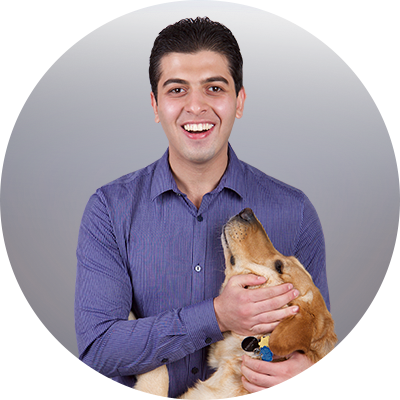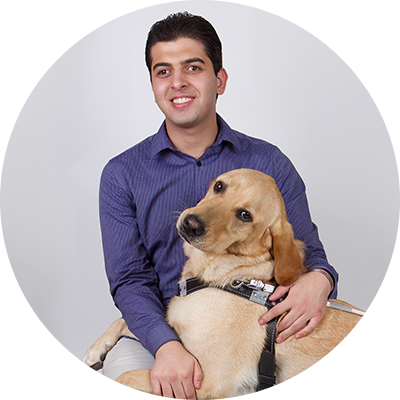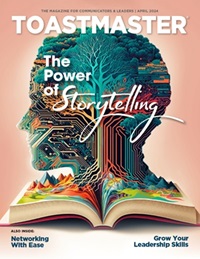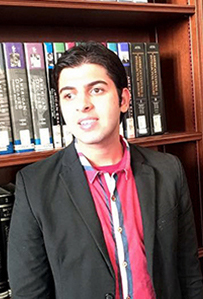When Ahmad Agha announced his decision to move to America by himself at the age of 17, his friends and family thought he was crazy. He had been blind since birth, had no contacts in the United States, spoke no English and had no money. No matter, he says: He had to do it.
Life in Saudi Arabia, where he and his family lived as Syrian-born immigrants, felt too limiting, he says. As a blind foreigner, he felt he didn’t fit in and lacked access to educational support, such as audiobooks, Braille books and technology to aid with reading. Returning to his home country of Syria was not an option, as civil war had erupted.
“As an individual who is internally motivated,” he says, “I wanted to learn more, to expand my horizon—to touch the stars, to be the best I can be.”
It took three attempts, but he was finally granted a student visa to study English. He borrowed some cash and was on his way to Los Angeles, California. He didn’t have much of a plan of what he wanted to do once he arrived. But he did have a firm resolve to somehow make it, get an education and change his life.
Today, four years after he arrived in the country, Ahmad is quite literally a new person—he has changed his name to Laurel Hilbert (more on that later). The 21-year-old now speaks English fluently and has moved from Los Angeles to New York to San Francisco. He joined Toastmasters and recently founded a small business and a nonprofit that helps homeless youth, a project inspired by his own experiences living in shelters. He has transformed his life by relying on his own grit and ambition, a little luck and the generosity of strangers whom he now calls friends.

Toastmaster Mohammad Khouja, ACS, ALB, who introduced Hilbert to his club in 2014, says he admires Hilbert’s drive and perseverance. “When someone tells him his situation is difficult, that [word] is not part of his vocabulary,” Khouja says. As a Syrian immigrant himself, he knows firsthand the challenges one faces moving to a new country. Khouja is impressed that Hilbert has not only accomplished so much alone, but that he’s done it as a young, sightless immigrant.
A Harrowing Start
When a driver picked up Hilbert from Los Angeles International Airport in August 2013, the teenager then known as Ahmad had just completed a 32-hour-long journey and only wanted a bed, a meal and a shower. He didn’t know how to communicate in English so he just asked for a hotel—any hotel. The driver took him to one that cost about 170 a night. Realizing it was far too expensive for a long-term stay, Hilbert stayed the night but left the next morning, taking only the luggage he could carry with him. He found a park to sleep in.
It was hardly the start he imagined for himself. “I think I was in full darkness in that park. I had never experienced sleeping in uninhabited areas, like park benches and streets, let alone in a culture that I did not understand, in a language I did not speak,” he recalls of his first several weeks.
Despite this daunting beginning, Hilbert pushed on. “I was homeless, but never hopeless. I had an endless vision. I told myself, No matter how bad it gets, I‘m going to make it.”
“My purpose in coming to this country was to learn,” he adds. “I knew that being homeless didn’t mean I had to stop learning.”
He found a gym near the park where he could shower and a library where he could access and listen to audiobooks. He paused at words he didn’t recognize and used Google Translate to find their meaning. “I was basically just collecting vocabulary and attempting to put this vocabulary in use, in context,” he says.
He continued for a couple of months. “The more I learned, the harder I pushed myself to keep expanding my knowledge of the language. And when I was able to communicate to some level with people, that’s when I was able to start connecting myself to resources.”
“Toastmasters has provided me with confidence, with the ability to break the silence. It has enabled me to embrace my unique gifts and deliver to the world my thoughts and ideas.”
— LAUREL HILBERTAt first, however, remaining in the Los Angeles park, Hilbert found it challenging to ask others for assistance. “I had so much pride,” he admits, “that I felt I should remain homeless until I [could] somehow get on my feet without asking people for help.” But one night he finally had enough.
“It really hit me hard. It was cold and I had nothing to cover myself with,” he recalls. “I was 17 and I was afraid. It was dark, I heard the trees rustling. At the time, I was just eating once a day to maintain my budget.”
He remembered someone giving him a piece of paper with the phone number of a nonprofit. So he dug it out and asked a person nearby to dial it on their cell phone. An employee at the nonprofit contacted Samar Ghannoum, an Arabic speaker involved in volunteer work in her Southern California community, asking her to look into this case of a blind boy living in the park. She arranged to meet Hilbert there with her husband. In a June 2017 Time magazine profile on Hilbert, Ghannoum recalls the moment she first saw him.
“Both of us were so devastated […] to see he was finding his way with a stick,” she said.
They gave him a sandwich, guessing he hadn’t eaten for a while, and brought him to their house. Ghannoum eventually helped him secure a place in high school, find housing and connect with a lawyer. She helped him reclassify his status and apply for affirmative asylum, which would grant him the right to continue staying legally in the United States (beyond his student visa), given the danger he would face were he to return to his now war-torn birth country of Syria.
In April 2014, he was granted asylum. Hilbert was ecstatic. “A friend of mine was asking me, ‘Why are you crying?’” he recalled in the Time article. “I’m like, ‘I’m just really joyful. I feel that I am getting closer to my goal every single day that passes by.’”
An Independent Spirit
Although Ghannoum and others helped him along the way, Hilbert has never required hand-holding or lost his self-sufficiency. In fact, the Time article notes that his “ability to figure out complicated systems—from bus routes to bureaucracy—has shaped his life just as much as his innate perseverance.” Even his name change reflected a skill for imaginative problem-solving.

As recounted in Time, an error at his Los Angeles high school left the teen—then known as Ahmad Agha—with another student’s ID card. “He was irritated by a teacher’s insistence that Laurel—the name on the card—surely couldn’t be his real name,” the article states. “He changed his own first name legally so that it was.” For his new last name, Laurel picked “Hilbert” after the German mathematician David Hilbert. He says changing his name was also symbolic: It represented a new life.
This tendency to embrace change and growth is in part what led Hilbert to join Toastmasters. At the suggestion of Mohammad Khouja, he joined the Empowered Business Professionals (now known as the Stagemasters club) in Glendale, California. The experience helped Hilbert fine-tune his language skills, organize his thoughts and better structure his sentences.
His favorite part about the club meetings is “connecting with people on a personal level, hearing their stories … learning from individuals who radiate an inner light. It’s being vulnerable among people whose main motive and concern is to [help] you develop your skills.”
Having Hilbert in the club setting was a positive learning experience for the club members too, says Khouja, since many had never interacted with a blind member and were inspired by the resolute young man standing before them, presenting speeches and even entertaining them with humor. During his Ice Breaker, he joked about his blindness being a gift—because he couldn’t see the room full of people staring at him which reduced his nervousness.
After leaving Los Angeles, Hilbert joined a club in New York and has recently started attending club meetings in San Francisco, where he now lives.
The Next Chapter
Hilbert received his green card in 2015, bringing him one step closer to becoming a U.S. citizen. He faced one obstacle after another and overcame them all. After living in Los Angeles, he moved to New York City because he needed a permanent address in order to receive continued educational assistance. Once in New York, he continued his schooling online while living in homeless shelters, and took government-sponsored classes to learn new technology that helps blind people work. He obtained a guide dog named Aero and eventually secured an internship that turned into a job as an international outreach assistant at Rennert International, a language school and translation company.
In June 2017, Hilbert left New York and headed to San Francisco to attend college. Upon arriving in San Francisco, Hilbert was unable to continue working remotely for Rennert International due to scheduling conflicts. Once again he was on the brink of homelessness. Ultimately, Bevin Dufty, a politician and longtime advocate for San Francisco’s homeless population, worked with an agency for homeless youth to secure Hilbert a place to live for up to two years.
Hilbert expresses gratitude to all the people who have helped him along the way and says he wants to “pay it forward.” To this end, he recently founded a nonprofit called A Dignified Home—Children and Youth Services to help improve the treatment of people in homeless shelters and group homes. His goal is to “promote the dignity of individuals who [are] not respected or are humiliated” due to their homelessness. “When I started experiencing homelessness, in many of those shelters I felt humiliated,” he says. More than once, he stood up for himself or others and was put back on the streets because of it. “I can’t keep my mouth shut. When I see injustice being done, even if it isn’t directed to me, I can’t stay quiet. I can’t not act.”
“My purpose in coming to this country was to learn. I knew that being homeless didn’t mean I had to stop learning.”
— LAUREL HILBERTWhat does the word “dignified” mean to Hilbert? “It goes all the way back to the values and traits my mom taught me. She taught me to value hard work and responsibility, as well as compassion and empathy. She made me value traits like honesty, hard work, kindness, courtesy, humility, responsibility, helping others out, being humble. That’s what my mom believes in, things that last.”
While the nonprofit is still in developmental stages, he aims to open its doors in June 2018. Hilbert is supporting his nonprofit through a side business he started by renting out his car on vehicle-sharing websites like Turo.com and GetAround.com. That is quite an accomplishment for anyone, let alone a young immigrant. “Of all that I have accomplished in my life, without a doubt, I am most proud that I have founded this nonprofit,” he says.
Meanwhile, Hilbert continues his studies. He currently takes classes at City College of San Francisco and hopes to transfer to the University of California, Berkeley, in 2019 to study social welfare. The following year, 2020, he is eligible for U.S. citizenship.


 Previous
Previous
 A Love of Learning
A Love of Learning
 Previous Article
Previous Article
